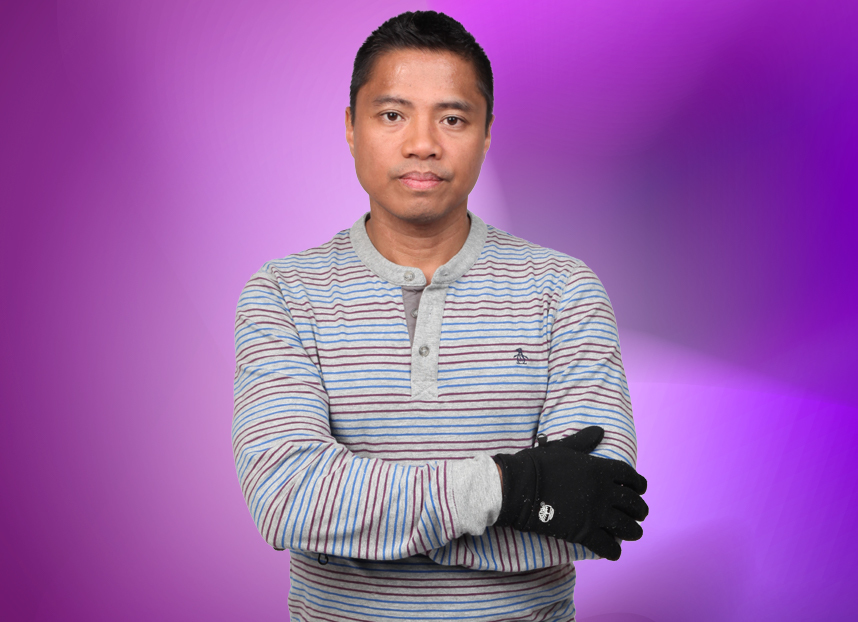Rudy Villamar: Conquering the Storm

It started with a strange and sudden swirl of symptoms during the summer of 2013 – a skin rash, enlarged lymph nodes on his neck and arms, and stiff knuckles and joints that would turn white in the shower. Rudy Villamar was 45 years old and suddenly felt like his body was turning on him from all sides for no apparent reason.
For months, his doctors were stumped, too. They initially suspected he had lymphoma due to his swollen lymph nodes, but when his symptoms weren’t getting any better, he was referred to an infectious disease doctor who then directed him to a rheumatologist.
“Lupus is a cruel mystery, because it’s tricky and confusing…That’s the scary part. It’s like the weather – it’s unpredictable,” Rudy explains.
Lupus is also commonly misunderstood as a women’s disease. But while lupus is more common in women than in men, research suggests that one in 10 people with lupus is male. With an estimated five million people around the world with the disease, there are tens of thousands of men living with lupus today. Yet, the pervasive misperception that lupus only affects women can make it more difficult for men to get an accurate diagnosis.
Men typically develop similar signs and symptoms as women. However, studies have shown men may experience a more severe form of the disease. For Rudy, the months following his diagnosis were difficult ones – he got multiple infections, was frequently sick, and his skin issues worsened.
“Lupus is like a bleak storm,” says Rudy. It can feel chaotic and isolating, and for Rudy, it even made him feel physically cold. Because lupus exacerbated his Raynaud’s disease (poor blood flow causing numbness), his hands and feet were almost always cold. He would wear three pairs of socks and use hand warmers constantly.
“The first six months were very tough, as it felt like I had the flu all the time, and even doing the smallest activity was exhausting.” Rudy was battling both the unpredictable effects of lupus as well as the side effects caused by some of his medications. Certain medicines made him feel so sick that he would have to miss work. “This impacted my performance at work, but I was fortunate to have a boss who worked out a flexible schedule for me.”
Now, nine years after his lupus diagnosis, Rudy has largely acclimated to his medications and has learned how to adjust to life with lupus. To manage his Raynaud’s disease, he moved from New York to Florida where the warm weather offers tremendous relief for his Raynaud’s – but even sunny days can feel gloomy with lupus, as direct sunlight can trigger symptoms. “Every day is a challenge, in that I have to think twice about everything I do…I want to feel warm, but I can’t be in the sun for fear of a lupus flare up.”
While Rudy has had to give up some of his favorite cold-and sunny-weather activities for the sake of his health, he’s also found new ways to cope. “I try to be as healthy as I can by continuing to work out and eat right. A big part of fighting is your attitude and perseverance. I have great support in my family and friends and talk to them a lot about life with lupus.”
He’s also discovered a passion for getting involved and raising awareness of lupus. Rudy has partnered with the Lupus Foundation of America (LFA) in multiple ways – as a top walker, a committee member for LFA fundraising events and through the LFA’s KNOW Lupus campaign. “The LFA of course brings me great confidence in the future for fighting this disease, and being part of the LFA family is truly a blessing.”
“There is hope – we just have to get involved. I haven’t given up.”
In addition to his work as a lupus warrior, Rudy gets a lot of his strength from his support group. “I’ve been going to lupus support groups, and that helps a lot, because you hear other people’s stories and what they’re going through … and you know you’re not the only one. My support group is amazing and a big comfort knowing they are there.”
Through the LFA, you have access to more than 150 support groups. These groups provide a safe and understanding environment where people with lupus can come together to ask questions, hear others’ perspectives and experiences and find – or offer – a shoulder to lean on.
There are support groups for everyone, including men, youth, and people who are Asian or Latino, or you can find support near you based on your location. If you’re not comfortable talking directly to others, the LFA invites you to join LupusConnect™, an online community where people with lupus and their loved ones can message with others and find support.
Take it from Rudy – there is a port in the storm, and you are not alone. Find the support that’s right for you.

Do you have a story to tell of living with lupus or caring for someone with lupus?



